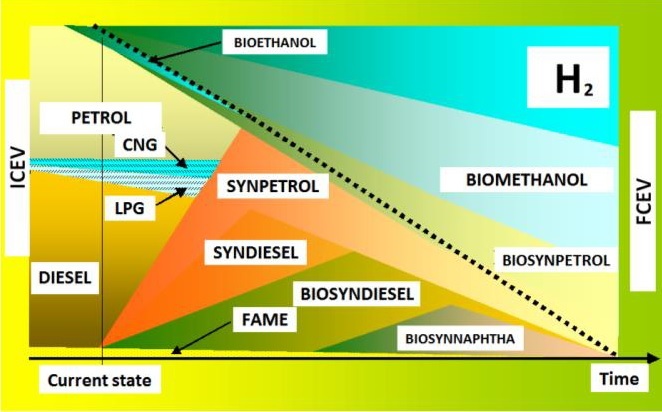Current issue
Online first
Archive
About the Journal
Aims and scope
Publisher and Editorial
Advertising policy
For Authors
Paper review procedures
Procedures protecting authentic authorship of papers
Paper preparation manual
Plagiarism check
Publication ethics
Reviewers
APC
Editorial and Scientific Board
Contact
Reviewers
Comparison of the cumulative energy demand of BEV and FCEV in their long-term operation
1
Faculty of Mechanical Engineering, Wroclaw University of Technology, Poland
Submission date: 2023-04-06
Final revision date: 2023-06-14
Acceptance date: 2023-06-16
Online publication date: 2023-11-23
Publication date: 2024-01-02
Corresponding author
Combustion Engines 2024,196(1), 24-29
KEYWORDS
TOPICS
ABSTRACT
The paper presents a method of using the theory of cumulative energy demand to assess this demand in long-term operation of vehicles with a mileage forecast of up to 350,000 km. Based on the results of operational "consumption" of energy and taking into account the energy "costs" of obtaining it, a comparison of the currently popular BEV’s (Battery Electric Vehicles) and FCEV’s (Fuel Cell Electric Vehicles) was presented. The question arises how much energy must be used to propel vehicles in their natural operation. After calculating with using of available data, the answer is – by operating of FCEV’s in average two time more electricity is need as by operating of BEV’s.
REFERENCES (14)
1.
Aksoy A, Küçükoğlu İ, Ene S, Öztürk N. Integrated emission and fuel consumption calculation model for green supply chain management. Procedia – Social and Behavioral Sciences. 2014;109:1106-1109. https://doi.org/10.1016/j.sbsp....
2.
Balcı Ö, Karagöz Y, Gezer O, Kale S, Köten H, Pusat S et al. Numerical and experimental investigation of fuel consumption and CO2 emission performance for a parallel hybrid vehicle. Alexandria Eng J. 2021;60(4):3649-3667. https://doi.org/10.1016/j.aej.....
3.
Braun A, Rid W. Energy consumption of an electric and an internal combustion passenger car. A comparative case study from real world data on the Erfurt circuit in Germany. Transp Res Procedia. 2017;27:468-475. https://doi.org/10.1016/j.trpr....
4.
Girtler J. Possibility of estimating the reliability of diesel engines by applying the theory of semi-Markov processes and making operational decisions by considering reliability of diagnosis on technical state of this sort of combustion engines. Combustion Engines. 2015;163(4):57-66. https://doi.org/10.19206/CE-11....
5.
Greene DL, Liu J, Khattak AJ, Wali B, Hopson JL, Goeltz R. How does on-road fuel economy vary with vehicle cumulative mileage and daily use? Transport Res D-Tr E. 2017;55:142-161. https://doi.org/10.1016/j.trd.....
6.
Katreddi S, Thiruvengadam A. Trip based modeling of fuel consumption in modern heavy-duty vehicles using artificial intelligence. Energies. 2021;14(24):8592. https://doi.org/10.3390/en1424....
7.
Kropiwnicki J, Kortas P. Potentials for fuel consumption reduction by using electronic driver assistance systems. Combustion Engines. 2013;154(3):250-256.
8.
Li W, Stanula P, Egede P, Kara S, Herrmann C. Determining the main factors influencing the energy consumption of electric vehicles in the usage phase. Procedia CIRP. 2016;48:352-357. https://doi.org/10.1016/j.proc....
9.
Sitnik LJ. Energy demand assessment for long term operation of vehicles. SAE Technical Paper 2020-01-2165. 2020. https://doi.org/10.4271/2020-0....
12.
Travesset-Baro O, Rosas-Casals M, Jover E. Transport energy consumption in mountainous roads. A comparative case study for internal combustion engines and electric vehicles in Andorra. Transport Res D-Tr E. 2015;34:16-26. https://doi.org/10.1016/j.trd.....
13.
Usmanov U, Ruzimov S, Tonoli A, Mukhitdinov A. Modeling, simulation and control strategy optimization of fuel cell hybrid electric vehicle. Vehicles. 2023;5(2):464-481. https://doi.org/10.3390/vehicl....
14.
Xu Y, Zhang H, Yang Y, Zhang J, Yang F, Yan D et al. Optimization of energy management strategy for extended range electric vehicles using multi-island genetic algorithm. J Energy Storage. 2023;61:106802. https://doi.org/10.1016/j.est.....
Share
RELATED ARTICLE
We process personal data collected when visiting the website. The function of obtaining information about users and their behavior is carried out by voluntarily entered information in forms and saving cookies in end devices. Data, including cookies, are used to provide services, improve the user experience and to analyze the traffic in accordance with the Privacy policy. Data are also collected and processed by Google Analytics tool (more).
You can change cookies settings in your browser. Restricted use of cookies in the browser configuration may affect some functionalities of the website.
You can change cookies settings in your browser. Restricted use of cookies in the browser configuration may affect some functionalities of the website.



